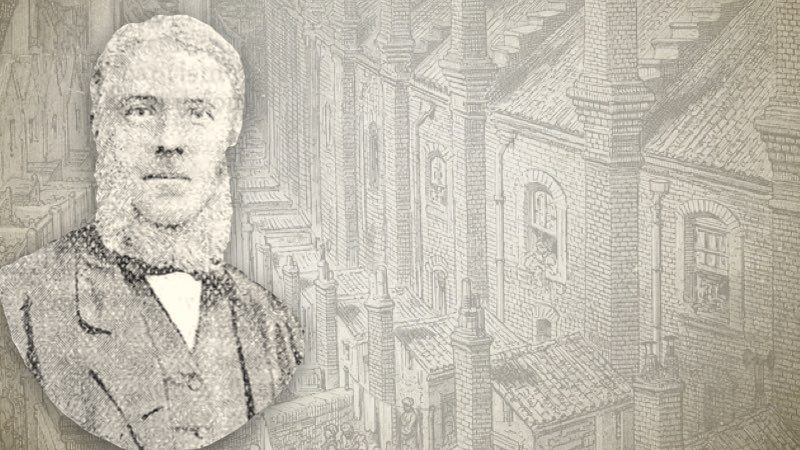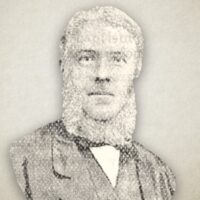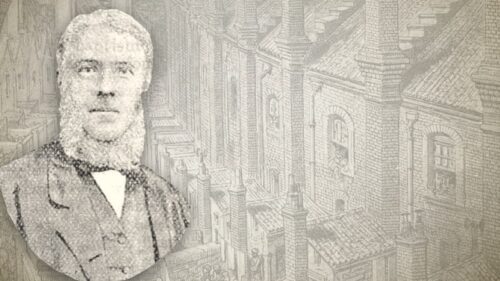
The Life And Ministry Of Henry Welch
Earthen Vessel 1891:
In the Earthen Vessel of March, 1884, there appeared a short account of the ministerial life at Tooting of this dear saint of God and faithful servant of Jesus Christ, who passed away from our midst on the morning of Monday, February 17th.
Mr. Welch was a member of the Congregational Church at Mitcham, and when quite a young man was invited to preach occasionally at a small chapel at Sutton. Becoming dissatisfied with the Congregational doctrines and order, he was recommended by his minister to a friend of his, Mr. Soule, a general Baptist at Battersea, by whom he was baptized. Not yet being happy, he went to hear Mr. J. Wells, and was convinced of the truth of the principles he preached, and joined the Church under Mr. Elvin’s pastorate at Clapham—Clapham being nearer than the Surrey Tabernacle to Merton, the place of his residence. A mile from Merton is Lower Tooting, where there was a little chapel occupied by a small church of the Huntingtonian order. Here Mr. Welch, though a Baptist, was occasionally invited to preach. (It was with this point our sketch of March, 1884, began.)
About the year 1854, the chapel was lost to the congregation, who removed into two rooms thrown into one, in a private house in Tooting Grove, and about the same time Mr. Welch was invited to preach regularly. Mr. Dee, the leading man, was like Mr. Welch, a Baptist, and also a member of a Clapham Church, but he of Mr. Ponsford’s. Some four years later the majority of the congregation acknowledged Believers’ Baptism, Mr. Welch baptized several of them, and a Church consisting of some fifteen persons was formed on Particular Baptist principles. He was, therefore, the instrument in founding the first Baptist Church at Tooting. As the space was insufficient to accommodate the worshippers, it was proposed to build a chapel; one friend, Mr. Cantle, kindly gave a plot of ground in the Grove; and a chapel was erected, and opened in January, 1863; Mr. C. W. Banks preaching the evening sermon. Here Mr. Welch’s pastorate extended over a period of twenty-one years. Having been removed by Providence from the locality into London, he felt it was the Divine will that he should terminate his long pastorate, and serve as an itinerant preacher. What seemed to make this more clear was that at this time Mr. G. Crutcher had friends at Ealham, a mile or so distant, who were hopeful that he might be brought to settle somewhere near them, and the Tooting Church and congregation heard him acceptably. Accordingly Mr. Welch resigned, and Mr. Crutcher was invited to the succession, and accepted it. Mr. Welch from this time supplied the pulpit in various causes in London and the country. But within the last few months he was compelled in consequence of failing strength to decline offered engagements. He then attended the ministry of Mr. Meeres at Bermondsey. He was taken ill on Feb 5th, and after eleven days of great suffering, passed peacefully away without a struggle on the morning of the 17th, in the 64th year of his age. During his short illness he more than once indicated to his dear wife an impression that the Lord was about to take him, and his preparedness to go when the Lord’s time should come. To this he gave many testimonies such as, “I am on the Rock, the Unchanging Rock, the Everlasting Rock:” “The bitterness of death is past:” (when closing his eyes) “Like my friend Dr. Watts, I do not mind whether I open them again in this world or the eternal world, but would rather it were the eternal world.” On one occasion one of his sons coming quietly to his bedroom, whilst at the door, heard him say to himself that his pains, which were very severe, were as nothing to the dear Saviour’s, bursting into tears. On Friday, the 14th, though very weak, he sang through the hymn beginning, “Soon as my infant lips can speak,” and concluding with this verse,
“O let me on the bed of death
Thy great salvation see,
And cry with my expiring breath,
Dear Lord, remember me.”
He was much comforted by Dr. Watts’s hymn commencing, “Begin, my tongue, some heavenly theme,” especially by the verse,
“He said, ‘Let the wide heaven be spread;’
And heaven was stretched abroad;
‘Abram, I’ll be thy God,’ He said;
And He was Abram’s God.”
His last words, spoken late on Sunday night, were, “I shall not die but live, and declare the works of the Lord.”
On Thursday, February 20, his precious mortal remains were committed to their last resting place in Nunhead Cemetery, the services being conducted by his old friend, Mr. Preston Davies, who described him as a fellow-Christian with whom he could not only talk but walk. A goodly company assembled to show this last token of love and esteem.
On the evening of Sunday, the 23rd, Mr. Meeres preached a funeral sermon from Psalm 37:37, “Mark the perfect man, and behold the upright, for the end of that man is peace.” He bore an affectionate testimony to the truly exemplary character of him whose loss he and all present were deploring. Tender is the tribute which the writer would pay, and which many will pay on reading these words, to his excellence as a faithful friend and a sincere Christian, whilst his sorrowing widow and family mourn a loving and devoted husband and father. May we all be prepared as he was when our time comes, and meet our dear friend, as he has met many friends who preceded him, in a brighter, better world, to part no more!
Henry Welch (1826-1890) was a Strict and Particular Baptist preacher. In 1858, he was appointed pastor of the church meeting at Tooting, a congregation himself organized upon believer’s baptism. He served this post for twenty-one years, after which he exercised an itinerate ministry.




